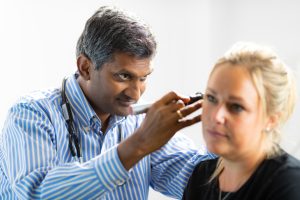Medical Associate Professions
Medical Associate Professions
The NHS has seen the emergence of new professional roles as part of the continuing drive to provide safe, accessible and high-quality care for patients.

As a physician associate, you might work in a GP surgery or be based in a hospital, but wherever you work, you'll have direct contact with patients.
You’ll be a graduate who has completed postgraduate training and you'll work under the supervision of a doctor. You’ll be trained to perform day-to-day tasks including:
- taking medical histories from patients
- performing physical examinations
- diagnosing illnesses
- seeing patients with long-term chronic conditions
- performing diagnostic and therapeutic procedures
- analysing test results
- developing management plans
- providing health promotion and disease prevention advice for patients
Clinical practitioners work in most departments so you could be working in:
- respiratory medicine, testing and assessing lung function
- occupational therapy, assessing people's need for aids and equipment at home
- an operating theatre area, scrubbing and assisting in surgical and other procedures, or monitoring patients recovering from surgery
- providing personal, social, therapeutic and rehabilitative care (such as bowel care and management, catheter insertion etc)
- dietetics, encouraging people to make healthier food choices
- biomedical science, analysing samples in a lab
- mental health services, supporting adults or young people with mental health issues
- stroke rehabilitation, helping people recover in their own homes
- emergency medicine, treating patients so they can return home quickly
- radiography, helping to diagnose or treat a patient's illness
- a health centre or GP surgery, changing dressings and monitoring medication
- hearing services, as a hearing aid dispenser
Surgical care practitioners are established members of the surgery team. Their main responsibilities are to support surgeons and other professionals before, during and after surgical procedures.
You'll be a trained clinical professional, such as a theatre nurse or operating department practitioner, who has received further training. You're trained to carry out a range of tasks in a surgical environment under the direct supervision of surgeon including:
- managing clinics where you would see patients before surgery, makings sure they are placed on surgery lists
- assessing patients to make sure they are clinically fit and healthy for the surgery
- preparing patients for surgery including venepuncture and catheterisation
- surgical procedures under direct supervision of a surgeon such as wound closure, harvesting veins and carpal tunnel surgery
- supporting a supervising surgeon as a first or second assistant
- daily ward rounds, making assessments and formulating plans for patients' post-operative care
- writing of operation notes and ward round note-taking
- care after the surgery such as wound assessment, treatment and identification of surgical problems and complications
- provision of support to on-call and emergency services
- evaluating a patient's condition, including the discharge process and follow-up care arrangements
- training of trainee surgeons
- prescribing appropriate medications
Anaesthesia associates work in the anaesthesia team, led by a consultant anaesthetist, and look after patients undergoing many aspects of critical care.
As an anaesthesia associate, you will be closely supervised by a consultant anaesthetist and there will be clear boundaries about what you can and cannot do.
Typically, the range of duties will include:
- preoperative interviewing and psychological assessment of patients
- collecting patient information from the patients, taking a history, physical examination, laboratory, radiographic and other diagnostic data and identifying relevant problems
- implementing the anaesthesia care plan
- administering and/or participating in the planned administration of general anaesthetic for a variety of surgical and medically related procedures
- using a broad variety of techniques, anaesthesia agents, drugs and equipment in providing anaesthesia care
- administering drugs as prescribed
- interpreting and using data obtained from invasive and non-invasive monitoring equipment
- initiating and managing fluid and blood therapy within the plan of care
- positioning or supervising the positioning of patients to assure optimal physiologic function and patient safety
- record keeping
- participating in audit, complaints, compliments and clinical/non-clinical incidents with a view to improving patient care as part of the wider anaesthetic team
- risk management and health and safety recommendations
- monitoring and maintaining a safe, clean, and therapeutic environment for patients, staff and visitors
- teaching, supervising and assessing other team members.
- identifying and taking appropriate actions related to anaesthesia equipment problems that might lead to patient problems and common postoperative problems
